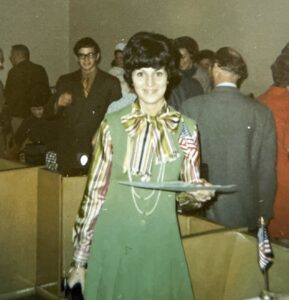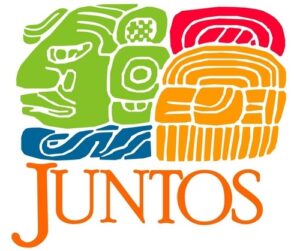Writing in English is my passion, although there is an internal voice that wants to translate my words into Spanish, particularly when it’s a clever saying or expression. Take “Fair and Square,” for example. It could be the literal “Justo y Cuadrado” that makes no sense at all, or the adverbial “Justa y honradamente,” which sounds so stiff. Even Google is no help with “Justo y claro,” that it’s plain incorrect.
For some unknown reason, growing up in Spain meant that girls studied French while boys learned English. Thus, when my family arrived to this country, I had to study the language in a technical school before I could finish my senior year in an American high school. Living in Seattle, Washington, meant that all my classmates were Asian immigrants. My brother teased me saying that I spoke with a Japanese accent, while it was obvious that his British accent via Madrid was even more out of place.
Given all the present controversies with immigration issues, I have been thinking about my own journey to become an American citizen fair and square. I had a student visa while I attended Purdue University, which expired shortly after I married my first husband, a proud Marine First Lieutenant. When he was stationed in Pensacola, Florida, we had to go to Mobile, Alabama, to find the closest Spanish Consulate. Unfortunately, our appointment coincided with a forthcoming hurricane and the consulate was closed when we arrived. Two assignments in Georgia and North Carolina quickly followed and I still didn’t have a visa. We didn’t even know where the closest consulate was, perhaps Miami or Washington D.C.
By then, I was expecting our first child and the Marine was ready to be deployed to Vietnam. He had spent the two previous years moving around the country and getting trained to fly the F-4 Phantom. I don’t remember thinking about my expired visa once again, we had bigger fish to fry (love this expression too, and no, don’t try to translate it into Spanish).
My husband’s squadron had already left and was stationed in Okinawa, Japan, and our baby hadn’t arrived yet. I don’t know who was more anxious, the first-time mom or the Marine flyer. To make matters more exciting, we found out that he needed top security clearance to fly over North Vietnam and I was undocumented at the time.
I remember that I was sitting at the kitchen table at our base housing, probably eating a BLT, my food of choice during the entire pregnancy, when a white unmarked sedan came into our driveway. I don’t remember being worried, I must have known that it couldn’t be an accident, since the airplanes had already been deployed. Two men in civilian clothing, dressed in grey suits, knocked at the door. Their badges told me that they belonged to the United States Immigration and Naturalization Service (INS then, ICE now). They opened their folders revealing a copy of my expired passport and some other documents I didn’t recognize. In a short time, I was signing a green card with my married name, Conchita Alborg Day. How quickly bureaucracy moved when INS was interested! Not to worry, I did become a naturalized American citizen in 1970, fair and square. I remember the kelly green outfit I wore and the American flag I was given as a souvenir.
Two men in civilian clothing, dressed in grey suits, knocked at the door. Their badges told me that they belonged to the United States Immigration and Naturalization Service (INS then, ICE now). They opened their folders revealing a copy of my expired passport and some other documents I didn’t recognize. In a short time, I was signing a green card with my married name, Conchita Alborg Day. How quickly bureaucracy moved when INS was interested! Not to worry, I did become a naturalized American citizen in 1970, fair and square. I remember the kelly green outfit I wore and the American flag I was given as a souvenir.
Last month I attended a presentation by Juntos, “a community-led, Latino immigrant organization in South Philadelphia fighting for our human rights as workers, parents, youth, and immigrants. We believe that every human being has the right to a quality education and the freedom to live with dignity regardless of immigration status.”  Since Philadelphia is a Sanctuary City, our Mayor has been rather silent on this issue, we could lose lots of funding to support our large Latino population under the current federal administration. You won’t be surprised to know that I have signed up as a volunteer to accompany them to court, where they are often expected to go without an attorney or a translator. Fair is fair.
Since Philadelphia is a Sanctuary City, our Mayor has been rather silent on this issue, we could lose lots of funding to support our large Latino population under the current federal administration. You won’t be surprised to know that I have signed up as a volunteer to accompany them to court, where they are often expected to go without an attorney or a translator. Fair is fair.

I love this, Concha! The use of American idioms, trying to translate them into Spanish, the BLTs that seem more American in this context than even PB&J (I just googled the history of each–they’re both early 20th century and they both really took off post WWII!), are such great devices to tell this story.
And thank you for your work with Juntos. They’re on my monthly donation list!
LJ
So glad you liked it and how right you are LJ! I should have been an American, since I ate so many BLTs.
XO, Concha
Es una expresión que me gusta, aunque nunca la he usado. Se me ocurre que , en algunos casos puede usarse como “de punta a cabo”, tú que crees?
Siempre me ha gustado escuchar y usar expresiones de ese tipo, dichos que significan algo diferente de lo que literalmente significan.
Y los refranes también.
Tengo una enorme colección de refranes españoles y te la voy a enviar. Cuando la veas si hay alguno que conoces, que te gusta y que no está, me lo mandas.
Un abrazo
Inés
Querida Inés,
Ahora pienso que la traducción debe ser “con todas las de la ley!” ¿No te parece?
Besos, Concha
Si, eso es.
Un Abrazo, Inés
Loved this!!! Randi
Thanks, Randi.
Love, Concha
Good morning, Concha,
I loved reading your “Fair and Square” essay. I learned something important about your history at the same time I was swept up by your writing. You have clearly mastered the English language. I don’t hear the slightest trace of a Japanese accent! Well done!
Lynn
So glad you liked it, Lynn. I always appreciate your comments, Concha
Concha, you made me weep. What has become of us? Much love, Cirel
Love back to you, Concha
Magnifico articulo, Concha. Gracias.
Larry
P.S. If Google Translate didn’t work, lo siento
Muchas gracias, Larry. Me alegro que te guste, Concha
Good for you Concha. Your ability to communicate will stead them well. Good luck!
Herman
Thanks so much, Herman. I always appreciate your comments, Concha
I’m a big supporter of Juntos too. My son and his friend founded it when they were 20 year old college students!
Elayne
Can’t wait to share notes with you. Concha